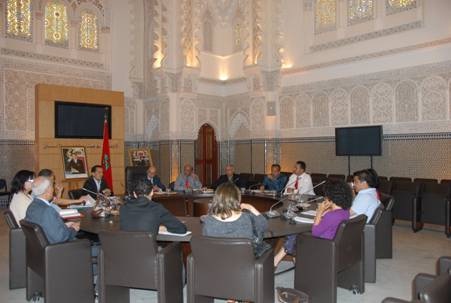A HIGH LEVEL NEPALI DELEGATION LEARNS ABOUT THE MOROCCAN EXPERIENCE IN TRANSITIONAL JUSTICE
A high level Nepali delegation visited the National Human Rights Council and met with CNDH officials to learn about the Moroccan experience in the field of transitional justice, on May 31st, 2011.
During this meeting, chaired by Mr. Mustapha Raisouni, Advisor to CNDH President, CNDH officials briefed the Nepali delegation on the context in which the Council was created, starting from the creation of the Advisory Council on Human Rights in 1990, to its reorganization in 2001 to be in compliance with the Paris Principles, to the creation of the National Human Rights Council in March 2011. This new Council has a broader mandate and reinforced independence and pluralism.
Speaking about the Moroccan experience in the field of transitional justice, Mr. Raisouni indicated that the Council worked on three phases. The first was related to the release of political prisoners and detainees in secret detention places and the return of the exiled.
The second phase, he continued, was related to the elucidation of truth and the identification of the numbers of the victims of enforced disappearance. In this regard, the Council established a first list of 112 cases of enforced disappearance. During the mandate of the Equity and Reconciliation Commission, the number of these cases reached 1048 cases. The truth was revealed about these cases, except 9.
The third was related to reparation. Mr. Raissouni highlighted the creation of the Independent Arbitration Committee in 1999 to compensate the victims of enforced disappearance and arbitrary detention. In 2004, the Equity and Reconciliation Commission was created to enlarge the concept of reparation, he said.
In addition to individual reparation, through the compensation of victims and their rights holders, the approach of the Equity and Reconciliation Commission included the philosophy of community (or collective) reparation. In this regard, the Community Reparation Program has been implemented. It concerns the realization of several projects in 11 areas. These areas were marginalized because of past human rights violations. The Moroccan truth committee didn’t turn a blind eye on the issue of social reintegration, health insurance coverage and the settlement of administrative and financial problems of victims and rights holders.
Mr. Raissouni indicated that the final report of the Equity and Reconciliation Commission included several recommendations. These recommendations are related to the reform of the penal policy and the judiciary, preservation of memory and national archives, primacy of the provisions of the international human rights law, criminalization of enforced disappearance and torture, reform of the constitution, security governance, etc. They were made to guarantee the non-repetition of the past grave human rights violations.
The Head of the Nepali delegation Mr. Dhruba P. Sharma said that his country is interested in the Moroccan experience in the field of transitional justice and best practices in the field of reconciliation and reparation. He stated that Nepal survived a bloody internal conflict that claimed thousands of victims. Mr. Sharma, Secretary of the Ministry of Peace and Reconstruction in Nepal, underlined his country’s will to establish a truth committee and a committee of enforced disappearance to settle the abuses of this conflict.
In addition to Mr. Sharma, the Nepali delegation was composed of Mr. Sadhuram Sapkota, Mr. Naresh Kumar, Mr. Sitaram Dhungel, from the Ministry of Peace and Reconstruction, Ms Sudha Uprety, Reparations Officer, OHCHR-Nepal, and Mr. Jitendra Bohra, Project Officer, IOM-Nepal.






















